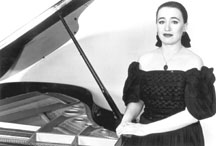Learning From the Russian School
Solo Flight: Pianist Viktoria Postnikova shone on Tchaikovsky's Concerto No. 2 in G Major for Piano and Orchestra.
The San Jose Symphony opens its season with an all-Russian program
By Philip Collins
ALL THAT was missing was black tea and caviar from the San Jose Symphony's all-Russian season opener Friday night. Music Director Leonid Grin connected with his Russian roots big time in a program of Rimsky-Korsakov's Capriccio espagnol, Prokofiev's Alexander Nevsky and Tchaikovsky's Concerto No. 2 in G Major for Piano and Orchestra, the latter of which featured Soviet pianist Viktoria Postnikova.
Mezzo-soprano Jacalyn Bower-Kreitzer, guest soloist in Prokofiev's cantata, is of American heritage, although her rich, mocha-thick voice rooted the work's penultimate movement, The Field of the Dead, in Russian soil.
Prokofiev's music for Alexander Nevsky, Sergei Eisenstein's 1938 film about Russia's heroic 13th-century prince of same name, made a walloping impact. Never has the cinematic complement seemed so superfluous. The seven-movement cantata, featuring full chorus and mezzo-soprano soloist, follows the same order of events as the film and many instanced sparked memories of Eisenstein's striking visual imagery.
The music, however, is a revelation onto itself. Tremendous thrust carries through the work--an emotional thread that sews together the sometimes abrupt changes from movement to movement. Such disparities are separated by reels of cinematic footage in the film version, but their juxtaposition in the cantata creates a kind of haltered continuity. Grin wisely opted to insert extended pauses between the more dissimilar movements.
Galen Marshall's Masterworks Chorale evidently sacrificed some of its summer vacation to prepare the score's taxing choral episodes. The members sang with fervor, warmth and remarkable clarity. The memorable ballad "Song About Alexander Nevsky" resounded with unity, and the tenors' high profile line (assisted by the altos) was beautiful enough to raise goose bumps.
Grin led the work with purposeful design, attentive to subtleties of tempos and expressive detail. With concerted focus, he held the line of tension taut, keeping the broad, sustaining sonorities moving forward with a sense of expansiveness.
The prelude--which in the film accompanies images of ravaged fields, bones and all--was severely paced, evoking the scene's chilling tenor through a seesawing respiration of ultrahigh wind sonorities and low string/brass chords. The score's cathartic peaks in the Battle on the Ice and Alexander's Entry Into Pskov (the finale), involving clashes between choir and orchestra, were brilliantly achieved, despite rhythmic misalignments during the former episode.
TCHAIKOVSKY'S second piano concerto is pure bliss for those inclined toward this composer's extreme lyric sensibilities. It is generously melodic and indefatigable in its capacity for invention. The first movement would be unendurable, in fact, were it not for the score's continual melodic refreshments. Because it clocks in a little under a half-hour (longer than the second and third movements combined), the opening allegro has often been subject to cuts.
Postnikova gave an enthralling performance. As in her 1994 visit here, when she performed Schnittke's thorny Concerto for Piano and String Orchestra, Postnikova wrested emotional substance from every note while maintaining a steady overall vantage. To great effect, her interpretation capitalized upon delicacies of coloration and grandness of gesture, qualities normally attributed to the "Russian School."
The first movement did not mesh as well as the two that followed. Although Postnikova authoritatively handled the opening allegro's blistering and stretchy virtuosities, some of the busy, lower-end passagework got buried in pedaling and wrong notes.
With the andante non troppo, things fell into place for soloist and orchestra alike. The range of timbres that Postnikova drew from the instrument was vast and yet intimately shaded. The finale glowed like chrome. She let into the movement with adolescent hormones, prodding momentum with strongly placed syncopations and utmost fluid dispatch.
As Tchaikovsky is wont to do, he sprinkled solos for the orchestra's principals throughout the concerto. The second movement gets more than a sprinkling, though. Concertmaster Byung-Woo Kim and assistant principal cellist Cheryl Fippen (filling in for Peter Gelfand) were jointly exquisite in their rendering of solos and duets during the movement. Their phrasing reflected handsomely upon the pianist's own. It captured the intimacy and expressive license Postnikova exercised throughout the movement.
Fippen's solo work also accounted for one of the few bright spots in Rimsky-Korsakov's Capriccio espagnol. The orchestra's reading was shaky and rushed--right out of the gate on the wrong foot. Except for the violins' fine voicing of the alborada theme, the ensemble work was disheveled and melodies, routine at best. A foreboding concert opener--i.e. season opener--that was gratifyingly eclipsed by the two companion works.
[ Metro | Metroactive Central | Archives ]
This page was designed and created by the Boulevards team.

Erato/Jacques Sarrat
From the September 12-18, 1996 issue of Metro
Copyright © 1996 Metro Publishing, Inc.
![[Metroactive Music]](/music/gifs/ma-music.gif)